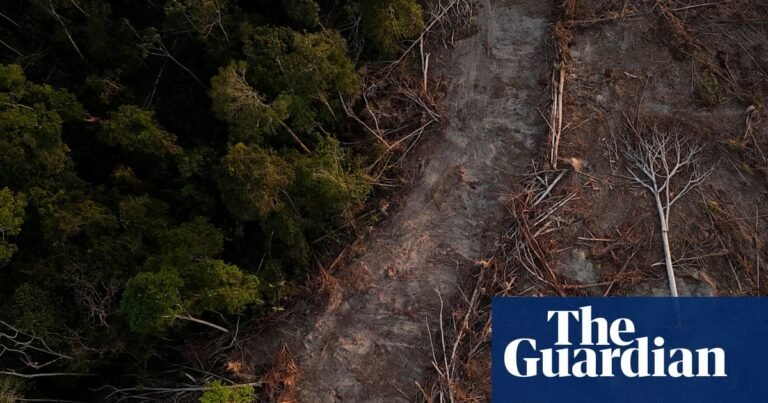Judges the world over are proving sceptical of firms’ makes an attempt to offset their greenhouse fuel emissions by shopping for carbon credit, a report has discovered.
In an evaluation of practically 3,000 climate-related lawsuits filed world wide since 2015, the newest annual review of climate litigation by the London College of Economics discovered motion towards companies specifically was “evolving”, with rising scrutiny of how firms plan to fulfill their said local weather commitments.
Dozens of authorized challenges over the previous decade have raised arguments associated to carbon credit, and plenty of have been profitable.
Final month, Vitality Australia acknowledged that carbon offsets didn’t stop or undo harm attributable to greenhouse fuel emissions, and apologised to its clients for allegedly deceptive advertising. The announcement adopted a greenwashing lawsuit introduced towards the vitality firm by a gaggle of Australian mother and father, which was settled out of court docket.
It was the first case in Australia to be introduced towards an organization for “carbon impartial” advertising, however solely certainly one of many the world over difficult comparable claims in high-emitting industries.
In October within the US, two residents of Portland, Oregon, sued the state’s largest natural gas company, NW Pure, over its “Sensible Vitality” offset scheme. Cash from the scheme goes to methane digester initiatives at industrial dairy farms, which the residents say launch important quantities of greenhouse gases and due to this fact breach state guidelines prohibiting unfair and misleading advertising claims. The corporate, which is also being sued by Multnomah County for allegedly sowing local weather doubt, says it will defend itself “vigorously” towards the allegations.
Circumstances comparable to these “give attention to the integrity of carbon credit and the claims that may be made concerning the carbon emissions of a services or products when credit are bought to ‘offset’ emissions from that services or products”, the LSE report discovered.
Different lawsuits goal firms and monetary providers that market themselves to sustainability-conscious customers, difficult an absence of transparency or readability.
In Germany, greenwashing lawsuits have proliferated after a judgment final yr towards the candy firm Katjes. The federal court of justice ruled that the corporate’s use of the time period “local weather impartial” to market its fruit gummies was ambiguous as a result of customers might both interpret it as an actual discount in emissions whereas the candy was being made or as the corporate having compensated for its emissions elsewhere. Katjes had executed the latter, by shopping for CO2 certificates.
In future, the German court docket concluded, firms might solely use these sorts of phrases in the event that they have been correctly defined throughout the advert itself.
These judicial choices observe comparable statements from promoting regulators and shopper safety our bodies, which have been cracking down on dubious climate neutrality claims for a number of years.
Some circumstances recognized by the LSE report have been prison in nature, with at the least three regarding allegations of carbon credit score fraud within the US in 2024. One involved a former carbon offsetting executive accused of serving to to govern knowledge from initiatives in rural Africa and Asia.
The LSE researchers stated such litigation highlighted “key challenges” within the operation of voluntary carbon markets, which have been beset by revelations that a lot of their credit do not represent genuine carbon reductions.
Authorized dangers, stronger regulation of company exercise in some components of the world, and growing consumer awareness of the nuances of offsetting claims do appear to be influencing company decision-making. Evaluation of firm local weather plans by Carbon Market Watch and the New Climate Institute confirmed practically all relied closely on offsetting in 2022, however their subsequent Company Local weather Duty Monitor report, due in July, will chart a shift away from probably deceptive claims.
after e-newsletter promotion
“Courts will proceed to play an important function in clarifying authorized boundaries for company duty within the context of web zero commitments,” the LSE concluded.
Whereas greenwashing lawsuits are inclined to give attention to claims made by firms of their most profitable markets within the world north, courts have additionally turn into concerned in disputes over whether or not offsetting schemes themselves – a lot of that are within the world south – respect the rights of native communities.
In January, a Kenyan court ruled in favour of a gaggle of individuals within the northern county of Isiolo who contested the institution of two conservancies inside their communally owned land by the Northern Rangelands Belief and its associates for an offsetting scheme described because the “world’s largest soil carbon removal project”. The scheme, utilized by large firms together with Meta, Netflix and British Airways, has long been under fire from Indigenous activists.
And in Brazil the federal public prosecutor’s office of the state of Pará just lately filed a lawsuit towards the federal authorities, the state of Pará and the Environmental Belongings and Participations Firm of Pará (Caapp), asking the federal court to immediately suspend and annul a contract for a large carbon offsetting venture.
It was the newest transfer in a bitter argument across the $180m (£132m) deal between Caapp and an organization representing the Leaf Coalition of company and authorities organisations. They aimed to sell carbon credits gained from lowering deforestation within the state, under a system called Redd+, to patrons world wide.
The LSE report discovered a rising physique of lawsuits during which weak communities or environmental teams have challenged local weather mitigation or adaptation initiatives primarily based on equity, procedural deficiencies or biodiversity hurt. The authors wrote: “Courts are being requested to arbitrate not solely on whether or not governments and firms act on local weather, but additionally how they accomplish that.”

